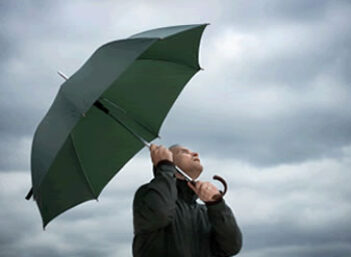You know those people who keep every store receipt and instruction manual nicely tucked away in a drawer or filing cabinet?
Turns out, they've had the right idea all along.
Why do I bring this up? Because I learned it the hard way -- after I was burglarized.
I went home for lunch break only to find my front door pried open with the lights left on. I stepped into our living room and looked to my right only to notice that our flat screen TV and our favorite video game systems and electronics were gone. Those, and an $1,800 MacBook Pro -- which we sorely miss.
At first I was in denial. Surely there had to be an explanation. Maybe my wife was furious about something I did, only to take all of our favorite things and move out. Perhaps in her rage she simply forgot to shut the door?
Then I came back to reality. I had been robbed. It's something that happens in alarm system commercials, but not something I'd ever think would actually happen to me.
So I want to share with you the four tips -- applicable to those with homeowners or renters' insurance -- I wish I had known before I was forced to make a personal belongings claim:
Homeowners Insurance Tip #1: Have Enough Personal Belonging Coverage
One good thing that came from this incident: It made me very glad that I paid my annoying renters' insurance premium every month.
Many apartment complexes require tenants to buy renters' insurance after signing a lease to cover your apartment's belongings in case of a fire or burglary. Don't worry, it's fairly inexpensive and worth having when things go awry.
Depending on your neighborhood, you could find a renters' insurance policy for as little as $10 a month to cover $10,000 to $20,000 worth of personal belongings.
Homeowners can follow this advice as well: Don't sell yourself short if you need more personal belongings coverage. Think of all your computers, laptops, TVs, expensive electronics, jewelry, camera and music equipment, artwork and collectibles. How much are they all worth? That amount -- plus a little extra just in case -- is the amount of personal belonging coverage you should have.
Homeowners Insurance Tip #2: Make a Most-Valuable-Item List Right Now
Think of all the gadgets, trinkets and collectibles you own and start typing up your 'most-valuable-items' list on a word document. Next to each item that you write down, list the amount you paid for the item.
If it's an electronic device of any sort, write down the serial number (usually found either in the instruction manual or in small print next to a barcode or 'SN' label on the device).
When it's completed, attach the document to an email and send it to yourself. Label the email something inconspicuous, like 'Christmas Pictures.' Store the email in a new email folder for safekeeping.
There's a reason for all of this and it's not to waste your time. This list will help you in two ways:
1) In case your things are damaged or stolen, you'll be able to refer to the list to see which of your valuables are still there and which are not.
2) You'll need to refer to the list if you file your insurance claim after a loss -- it shows what might need to be replaced/repaired. The serial numbers are also valuable when filing a claim, as they let the insurance company know that you did actually buy the product and you aren't just making an early Christmas wish-list.
[Be prepared for natural disasters: 7 Steps to Getting Your Home Insurance Claim Paid Fast]
Homeowners Insurance Tip #3: Gather 'Proof' of Purchase -- Photos, Receipts and Instruction Manuals
When I filed my claim the day after the incident, I was asked by the insurance representative to list the items that I 'claimed' to be stolen. Luckily, I had our list (like the one above) of things we knew were stolen before I called -- simple enough.
But as we were wrapping up the report, the representative asked me to provide 'proof' that I owned the items. Proof? The items were stolen, how could I prove I had them in the first place?
- Keep your receipts from now on; they show identifiable serial numbers, proof of purchase and the item's original value.
- Instruction manuals, as I learned, also act as proof of purchase, as they contain identifiable serial numbers for each of your items. Keep these in a shoebox or filing cabinet -- yes, you'll be like one of those super-organized people mentioned earlier, but it's for good reason.
- Finally, take digital photos of all of your pricey items, from electronics to furniture, and email them to yourself or save them in a cloud-based shared folder. If you just save the photos on your computer's hard drive and that gets stolen, you're of luck. If you're less tech-savvy, physical photos stored in a drawer will work fine as well.
Homeowners Insurance Tip #4: Caught Unprepared? Other Ways to Find Proof of Purchase
I know. I used to toss many of my receipts too, before I learned. But lacking proof that you owned an item will make an insurance company hesitant to dole out a big claims check.
In case you've already been burglarized or are otherwise unprepared (like we were), here are some last-minute places to find proof of purchase:
1) Check your email -- An online shopper can use 'confirmation' emails as proof.
2) Look at your PayPal history -- Each transaction will show purchase information.
3) Dig through drawers for old instruction manuals and product warranties.
4) Find photographs with the missing items shown -- a picture with you sitting on a couch that was stolen helps your case for a claim as well.
Think of any piece of evidence to support your claim that you owned that stolen item. The more evidence, the stronger your case and the more likely you are to receive a claims check for the amount you need to replace your items.
Dealing with home or renters' insurance may seem like a lot of hassle, but it's worth every penny when the unexpected happens. The sooner you start keeping records of every big-ticket item you get from, the sooner you'll receive your claims check if you're ever forced to use your home or renters' insurance. And believe me, if you ever have some of your most-valuable possessions stolen, you'll want that check fast to start replacing your things.



